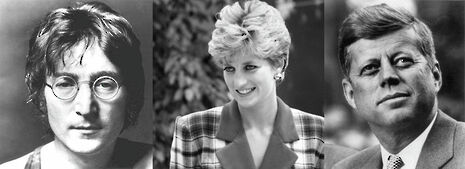Rest in … Eternal Fame?
Lydia Bunt asks if new technology has ended the era of the iconic celebrity death

I’m no astronomer, so please excuse the poorly-formulated metaphor here, but it seems to me that celebrities are a little like red giants. Throughout their lives, they grow larger and larger until their outer layers float away and only a small, insignificant neutron star is left. Or, they explode into a black hole: an empty void, out of which even light cannot escape. 2016 has seen several ‘stars’ kick the bucket, but do the deaths of Fidel Castro, David Bowie, or Carrie Fisher have ‘black hole’ potential in the vein of those of, say, JFK, John Lennon, or Princess Diana? I think not.
What makes a celebrity’s death iconic? To start with, it has to be unexpected and perhaps unjust as well: a moment that shouldn’t have happened, an event that ruptures the present and shakes up our lives in a supernova of suddenness. It’s not about who the celebrity was when alive, but who they were in their death, and the changes that this wreaks on the zeitgeist. By asking ‘Where were you when…?’, we savour the moment that someone else didn’t get to live, but that we – perhaps undeservedly – did.
Thinking this over, I ask my parents the question. ‘Oh yes’, says my mum, ‘I remember exactly where I was when Diana died. I was walking down the stairs in the old house in Bromley when Dad said ‘Have you heard?’. My dad, aged 14, was walking to the bus stop when a friend told him about Lennon. He’s 50 now, but he still remembers.
For me, the deaths of Alan Rickman and Harper Lee in 2016 struck the greatest chord. They were emblematic of films and books I have loved and which set out train tracks for my childhood imagination. But as to where exactly I was when I heard the sad news, I really have no idea. I probably flicked past it in my morning scroll through Facebook. I have no associations with a particular place, or a telling word of mouth.
"But as to where exactly I was when I heard the sad news, I really have no idea. I probably flicked past it in my morning scroll through Facebook."
Why, in the first weeks of 2017, do we seem incapable of such vivid spatial recollections as our parents experienced? Firstly, and most obviously, the celebrity deaths of 2016 were largely preemptible. They lacked the explosive, awful quality that imprints itself on the minds of a public hungry for celebrity culture. This is especially noticeable in a year which, as I’m sure we’d all agree, has hardly lacked in explosive events.
However, there’s more to it. As the technological ability to be everywhere at once has developed, it seems to me that the idea of ‘being somewhere’ when something big happens has been lost. We don’t live in the moment, but in a series of moments dictated by social media. Deaths aren’t shocking any more because they are common property, passed from webpage to newsfeed to story in an explosion of information. There is so much solidarity for celebrities in their deaths that solidarity no longer holds any meaning.
If the iconic celebrity death is no more, this suggests that, in the clutter of our post-truth society, there is less room for those black holes: the stars missed so much that even their deaths are remembered. Maybe this is inevitable.
Or maybe we should raise our eyes from the screen and the world of everywhere-ness, and ask ourselves the question ‘Where were you when…?’ more often, whether with regard to Wogan or Wood, Bowie or Ali. Its asking provides a means for being in the moment; for appreciating the life that we still have even though others have relinquished it. In a New Year where even the sensational is sensationalised, this would be a good resolution to adopt – because it shouldn’t be death, but life, that makes a celebrity iconic.
 Interviews / ‘People just walk away’: the sense of exclusion felt by foundation year students19 April 2024
Interviews / ‘People just walk away’: the sense of exclusion felt by foundation year students19 April 2024 News / Copycat don caught again19 April 2024
News / Copycat don caught again19 April 2024 News / John’s spent over 17 times more on chapel choir than axed St John’s Voices22 April 2024
News / John’s spent over 17 times more on chapel choir than axed St John’s Voices22 April 2024 News / Climate activists smash windows of Cambridge Energy Institute22 April 2024
News / Climate activists smash windows of Cambridge Energy Institute22 April 2024 Theatre / The closest Cambridge comes to a Drama degree 19 April 2024
Theatre / The closest Cambridge comes to a Drama degree 19 April 2024





